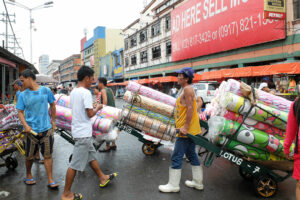Towards strengthening anti-money laundering in the country

The Philippines has been deemed to be vulnerable to money laundering and terrorism funding. This, according to the Philippinest AML (Anti-Money Laundering) Report, is due to its growing economy and geographic positioning within major trafficking routes. Strengthening AML laws and regulations is therefore crucial to address the risk and fight financial crimes.
Money laundering is an illegal process of making assets or cash obtained from criminal activities appear to have come from legitimate sources. Simply put, from the word itself, money laundering makes dirty money look clean.
Back in 2000, lacking basic legal AML framework, the Philippines was blacklisted by the global money laundering and terrorist financing watchdog Financial Action Task Force (FATF), falling under its list of Non-Cooperative Countries and Territories (NCCT).
It was on Sept. 29, 2001 when the Republic Act (RA) No. 9160, otherwise known as the Anti-Money Laundering Act of 2001 (AMLA), was signed into law.
It declared the policy of the State “to protect and preserve the integrity and confidentiality of bank accounts and to ensure that the Philippines shall not be used as a money laundering site for the proceeds of any unlawful activity.”
Under the AMLA, the State should also “extend cooperation in transnational investigations and prosecutions of persons involved in money laundering activities wherever committed.”
The law also created the Anti-Money Laundering Council (AMLC), which is tasked to implement the AMLA. AMLC is composed of the Bangko Sentral ng Pilipinas Governor as chairman, and the commissioner of the Insurance Commission and the chairman of the Securities and Exchange Commission as members, acting unanimously in the discharge of its functions.
But despite the RA 9160, the country remained on the NCCT list. The AMLA was then first amended through RA 9194 signed in March 2003. The amendments included the reporting of suspicious transactions, among others. The country was removed from the NCCT list in February 2005.
However, due to the lack of laws on counter-terrorism financing (CTF) and other required regulations, the Philippines was placed on the grey list in February 2010. It had to address the identified AML/CTF deficiencies until December 2011, which it failed to meet and was downgraded to the dark grey list in February 2012.
AMLA was further amended through RA 10167, and RA 10168 or the Terrorism Financing Prevention and Suppression Act of 2012 was signed, bringing the country back to the grey list yet urged to fully address the remaining deficiencies.
In February 2013, through the signing of RA 10365, AMLA utnderwent its third amendment. That year, the country exited the grey list but remained on the watchlist. The FATF still expressed concerns about the casino sector risk and the lack of coverage under the AMLA. Casino operatzions were later covered under the AMLA through the passage of RA 10927 signed in July 2017. The country was then removed from the watchlist.
Looking to further strengthen anti-money laundering regulations, AMLA was amended through RA 11521 signed in January 2021 and took effect on Feb. 8 last year. Part of such amendments, among others, include additional powers to AMLC and new covered persons.
Among the powers granted to AMLC are to apply for the issuance of a search and seizure order and subpoena before a competent court and the authority to “preserve, manage or dispose assets pursuant to a freeze order, asset preservation order, or judgment of forfeiture.”
The law also added “real estate developers and brokers” and “offshore gaming operators, as well as their service providers” as covered persons. It also required real estate developers and brokers to report single cash transactions that exceed P7.5 million to AMLC.
Furthermore, under the RA 11521, “the implementation of targeted financial sanctions related to the financing of the proliferation of weapons of mass destruction, terrorism, and financing of terrorism, pursuant to the resolutions of the United Nations Security Council” is added in the declared policy of the State.
The Philippines has returned to FATF’s list of “Jurisdictions Under Increased Monitoring” or the grey list in June 2021.
The watchdog, in a statement last month, said the country should continue to implement measures concerning casino junkets, beneficial ownership, non-profit organizations.
It nonetheless recognized the country’s progress since June last year, when it made “a high-level commitment to work with the FATF and APG (Asia/Pacific Group on Money Laundering) to strengthen the effectiveness of its AML/CFT regime.” — Chelsey Keith P. Ignacio




